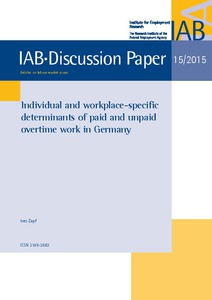Individual and workplace-specific determinants of paid and unpaid overtime work in Germany
"In Germany, overtime work is a well-established instrument for varying working hours of employees and is of great importance for establishments as a measure of internal flexibility. However, not all employees are affected to the same degree by a variation of the work effort through overtime wo...
| Main Author: | |
|---|---|
| Institution: | ETUI-European Trade Union Institute |
| Format: | TEXT |
| Language: | English |
| Published: |
Nürnberg
2015
IAB |
| Subjects: | |
| Online Access: | https://www.labourline.org/KENTIKA-19112687124919308699-individual-and-workplace-speci.htm |
| Summary: | "In Germany, overtime work is a well-established instrument for varying working hours of employees and is of great importance for establishments as a measure of internal flexibility. However, not all employees are affected to the same degree by a variation of the work effort through overtime work. Besides socio-demographic factors, workplace-specific factors that provide information about the position of employees in the establishment play an important role, too. So far, we do not know enough how these workplace-specific factors are associated with overtime work. This question is at the centre of this study. In the analysis, women and part-time employees are taken into account, while previous studies mostly focused on fulltime employees and/or male workers. On the basis of the data of the German Socio- Economic Panel (SOEP), the results show a significant negative correlation between women and paid overtime and between part-time employees and unpaid overtime. If the employees performance is regularly assessed by a superior, paid overtime is less likely, while unpaid overtime becomes more likely. In executive positions, there is a significant positive correlation with paid and unpaid overtime work. Unpaid overtime is more likely with a growing autonomy in the employees' workplace, whereas paid overtime becomes less likely. However, the length of the training period on the job as well as job related burdens due to a job at risk and a limited employment contract seem to have no association with paid or unpaid overtime." |
|---|---|
| Physical Description: | 31 p. Digital |

